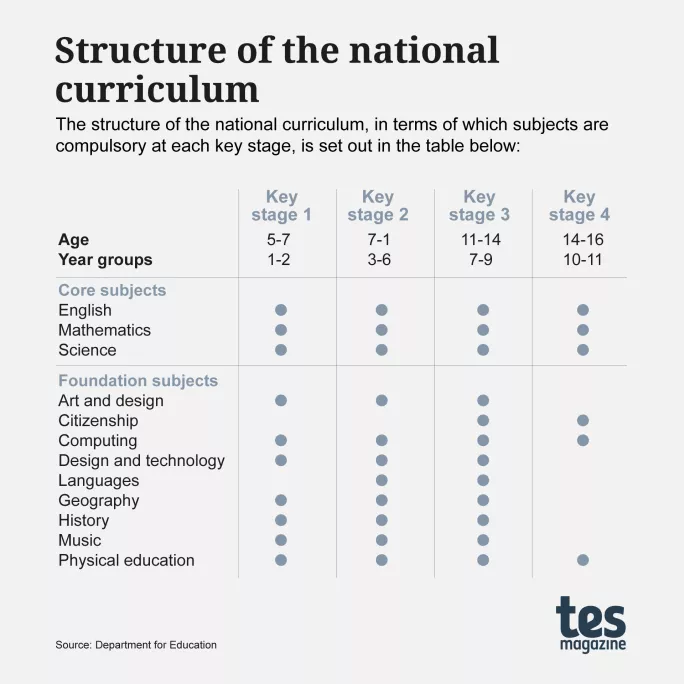

The national curriculum is a document produced by the Department for Education (DfE) that sets out the areas of study that schools must provide to pupils.
It covers both primary schools and secondary schools across key stages 1-4. All local authority-maintained state schools must deliver the national curriculum by law.
Schools within multi-academy trusts (MATs) are not required legally to adhere to the national curriculum, but the vast majority do because it provides a helpful basis for their legal requirement to provide a broad and balanced curriculum as set out in the Academies Act 2010.
It also ensures that pupil learning aligns with assessment stages - chiefly Sats at the end of primary and GCSEs at the end of secondary school.
Private schools also do not have to adhere to the national curriculum but again many do as it helps them meet government requirements to operate as educational establishments and helps ensure students can sit the most popular assessments like state-school pupils.
The full national curriculum document runs to 264 pages and was last updated in 2014.
At 201 pages long, the guidance contains a raft of information explaining the core elements of what schools are expected to teach in everything from spelling and grammar to mathematics, science, music and history.
It also includes the purpose of each area of study and expected levels of achievement, with reference to specific learning outcomes. To assess the progress of pupils against the requirement of the national curriculum, there are several assessments during primary school.
The most well-known assessments are Sats (technically called the national curriculum tests, or NCTs), which take place in the final year of primary school, covering English reading, English grammar, punctuation and spelling, and maths. Other tests during primary include the phonics screening check in Year 1 and the relatively new multiplication tables check (MTC) in Year 4.
The national curriculum for primary also requires schools to teach religious education to primary pupils, although parents can ask for their children to be taken out of the whole lesson or part of RE lessons.

Meanwhile, since 2021, primary schools have been required to teach both health education and relationships education as part of their statutory requirements under the national curriculum.
The national curriculum for secondary schools is 101 pages long and covers key stages 3 and 4. The most recent version was published in 2014.
It contains information for schools on the purpose of study, aims, assessment expectations and subject content for all compulsory subjects covered in key stage 3: English, maths, science, art and design, computing, design and technology, languages, geography, history, music and PE. Citizenship is also added as a new compulsory subject for KS3 learners.
Things change slightly for key stage 4 - the two school years that incorporate GCSEs - when English, maths, science, citizenship and computing remain compulsory, but other choices become optional.

The secondary curriculum also requires schools to provide RE but again parents can ask for their children to be taken out of these lessons for cultural or religious reasons.
Since 2021, both relationships and sex education (RSE) and health education have become compulsory too within the national curriculum at both KS3 and KS4.
The Ofsted framework does not explicitly state it will judge schools on their delivery of the national curriculum itself but it does say schools are expected to ensure “learners study the full curriculum” and schools provide a curriculum suitable for all learners.
The framework states: “[Ofsted will judge to what extent leaders] construct a curriculum that is ambitious and designed to give all learners, particularly the most disadvantaged and those with special educational needs and/or disabilities (SEND) or high needs, the knowledge and cultural capital they need to succeed in life.”
For Years 12 and 13, when students specialise at AS and A level, there is no set national curriculum but the government does set out guidance for all subjects offered to ensure that schools and sixth forms know what is expected to be studied within each subject.